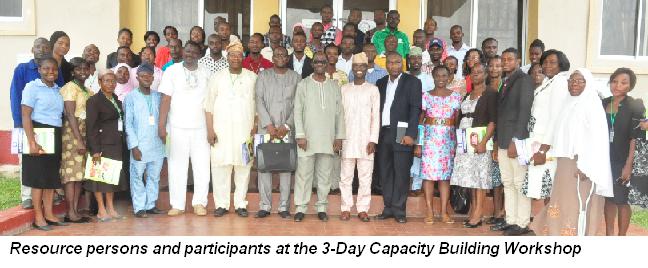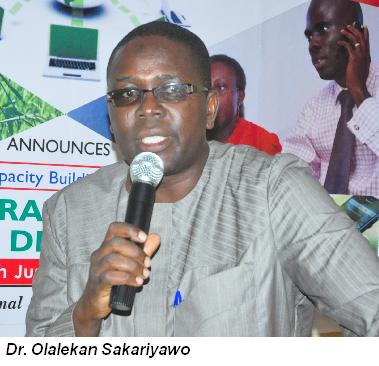With the widening gap between the industry and the university, the Director of Grants Management, Professor Kolawole Adebayo, has called for the acceptance of information as the fifth factor of agricultural production. According to him, “There are ways that traditional economics should have improved itself longtime ago by bringing in information as a fifth factor of production. Today’s economics is telling us that without critical information, all the other factors of production cannot be harnessed at their best and optimally useful”.
Delivering a keynote speech at a 3-Day Capacity Building Workshop on Agricultural Information Systems Development, organised by the World Bank Africa Centre of Excellence in Agricultural Development and Sustainable Environment (CEADESE), Professor Adebayo said that information was the secret weapon among the factors of production and that was why the traditional economics have been silent about it, adding that what distinguishes a successful entrepreneur from a less successful one was the amount of information at his/her disposal and how to deploy that information to achieve the goals of his/her enterprises.

Professor Adebayo, who is also the Project Director of CAVA II, said that people, who were into agriculture and agro-allied enterprises, could access a large body of data from agricultural production to processing to marketing to the logistics of management of movement of goods and services in agriculture to export and international trading in agriculture to extension services as well as to research. He noted that there were several distinct units of data that needed to be processed to become valuable information and cautioned that when a large body of data are scattered and abused, there would not be a coherent message, as he congratulated participants at the workshop for the opportunity to launch themselves into the emerging trend of modern agricultural enterprises management in an information era.
According to him, “I am very happy that we had moved a lot in terms of information management in agriculture”. He further said that as at today, the agricultural value chain differs significantly from its traditional agricultural practices because of the central role of information, saying that “If you are able to transact e-businesses in agriculture, you are better-off than those that can only do cash businesses”. Professor Adebayo described the e-wallet, an Information Communications Technology-based mechanism that allows farmers to acquire inputs and allows government to target subsidy end users, adding that agricultural value chain require information to function, as the emergence of ICT in the agricultural sector, has created new actors in the chain. He noted that the new actors needed to be knowledgeable individuals, not only about agriculture and agricultural practices, but about the use of information to maximise opportunities that agriculture offers.
Professor Adebayo stated that the University was well positioned to play a key role in the training of new cadre of manpower that is required to drive this information service agricultural system. He, however, congratulated CEADESE for the workshop, as it would help the University to achieve its key objectives of bringing in the right kind of manpower into agriculture. He said that FUNAAB operates a 10 collegiate structure with 14 service centres, including CEADESE. He stressed that the operational arms link up with production farms, agro-processing industries; logistics support services and other ancillary units in the agricultural sector. He added that it was to provide the right kind of people for the future of agriculture, adding that “We are about achieving it so that the knowledge acquired from the workshop could be used to improve the agricultural services of this country”.
Delivering a paper titled, “Introduction to Information Systems Development: Application to Agriculture”, the Director, Centre for Innovation and Strategy in Learning and Teaching (CISLT) of FUNAAB, Dr. Olusegun Folorunso, stated that information services should be made available in all regional languages and at the farmers’ door steps. He stressed that there should be a change in the mindset that would motivate the people towards the building of comprehensive database and information systems for the farming community. Dr. Folorunsho further stated that the development and implementation of proper early warning systems, advisory services, development of expert systems on what-to-grow, when and where; would enhance agricultural productivity. He added that bridging the gap, through the judicious use of ICT between knowledge and practice for sustainable use of natural resources and linkages between research, technology and production as well as reliable and comprehensive information, should be made available at anywhere and anytime. In another lecture titled, “Ethical and Societal Issues in Agricultural Information Systems”, Dr. Folorunso had described agricultural information systems as uniquely positioned to capture, store, process and communicate timely information to decision-makers for better coordination of agricultural systems.
In his lecture titled, “Agricultural Systems, Data Gathering and Agricultural Information Systems: A Conceptual Approach and Nexus with Agricultural Productivity”, Dr. Olalekan Sakariyawo, had described the basic objectives of agricultural system as the provisions of food, feed, fibre and fuel, adding that it could be inferred that agricultural system is multi-functional with externalities. According to him, the use of ICT in agriculture could foster sustainable intensification through reduced cost of agricultural input, increased revenue and income, increased biodiversity in an ecosystem, engendering intelligent response to variable environmental factors and ensuring faster service delivery. Others include increased traceability of the resource input towards a healthier foods delivery and environment, increased networking, collaborative efforts among all the stakeholders, improving technology adoption and increased access to information.
Delivering a lecture titled, “Information Storage and Retrieval, Database Management Systems (DBMS), Using MS Access”, Mr. Ayofemi Emmanuel, had described database as the collection of related files, containing records on people, places or things, noting that prior to digital databases, business used file cabinets with paper files. Mr. Emmanuel stated that to manage information properly, farmers must understand some important principles of database design, adding that database tools and technologies for accessing information from databases help to improve farm yield, income performance and decision-making. He further said that database also ensures good information policy, data administration and data quality assurance through the management of the farm’s data resources.
Speaking on the presentation titled, “Principles of Information Dissemination and Feedback Mechanisms Using ICT Resources”, which was basically a practical session, Mr. Olusegun Adeosun, stated that agricultural informatisation could be described as the degree and process of transforming agriculture sector, through the effective use of ICTs in agricultural production, operation and management. Dr. Matthew Olayiwola, while delivering the paper titled, “R System for Statistical Computing”, stated that ‘R’ is a flexible statistical software package that offers the environment an object-oriented programming and statistical data analysis. In his presentation titled, “Principles of Data Manipulation and Information Analysis Using MS-Excel”, Mr. Oluwaseun Hamzat, had described spreadsheet as a computer programme that displays numerical data in cells in a simulated accountant’s worksheet of rows and columns in which hidden formulas can perform calculations on the visible data.
Earlier, the Director of CEADESE, Professor Okanlawon Onagbesan, had stated that the days were gone when people sit down in their laboratories, formulate research and just publish papers such as for promotion, even though “we get accused all the time by the industry that we have not been where we are supposed to be”. According to him, “We are not influencing them. No contact with them because there is nothing they could use from the university”. He disclosed that the CEADESE was created to bridge such gaps, saying that the purpose of the workshop was to discuss things that were not usually learned in the class. Professor Onagbesan stressed that the workshop was to expose participants on how to collect data and process them to make them more useful not only to themselves, but to the industry and government, adding that there would be four more workshops before December, this year. He noted that there would also be opportunities for CEADESE students to attend free-of-charge, as participants were presented with certificates at the occasion.
